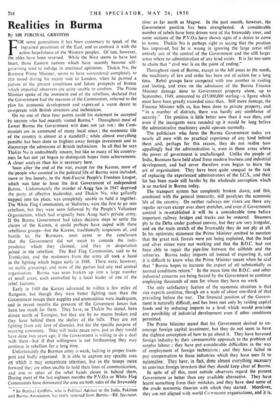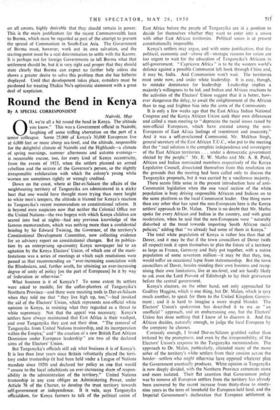Realities in Burma
By SIR PERCIVAL GRIFFITHS
FOR some generations it has been customary to speak of the ingrained pessimism of the East, and to contrast it with the active hopefulness of the Western peoples. Of late, however, the roles have been reversed. While the West seems to have lost heart, those Eastern nations which have recently become self- governing tend to indulge in uncritical optimism. Thakin Nu, the Burmese Prime Minister, seems to have surrendered completely to this mood during his recent visit to London, when he painted a picture of the present conditions and future prospects of Burma which impartial observers are quite unable to confirm. The Prime Minister spoke of the imminent end of the rebellion, declared that the Government had the measure of the Communists, referred to the plan fot economic development and expressed a warm desire to co-operate with British investors and technicians.
On no one of these four points could his statement be accepted by anyone who had recently visited Burma.* Throughout most of Lower Burma the Government writ does not yet run ; the Com- munists are in command of many local areas ; the economic life of the country is almost at a standstill ; while almost everything possible has been done to frighten away foreign investment and to discourage the admission of British technicians. In all that he says Thakin Nu is undoubtedly sincere, but like so many of his country- men he has not yet begun to distinguish hopes from achievements. A closer analysis than his is necessary here.
Soon after the end of the war, except for the Karens, most of the people who counted in the political life of Burma were included, more or less loosely, in the Anti-Fascist People's Freedom League, which was later to form the first Government of independent Burma. Unfortunately the murder of Aug San in 1947 deprived the party of effective leadership, and Thakin Nu, who gallantly stepped into his place, was completely unable to hold it together. The White Flag Communists, or Stalinites, were the first to go into rebellion, but they were soon followed by the People's Volunteer Organisation, which had originally been Aung San's private army. If the Burma Government had taken decisive steps to settle the claims of the Karens, it could perhaps have coped with these rebellious groups—but the Karens, traditionally suspicious of, and hostile to, the Burmans, soon came to the conclusion that the Government did not mean to concede the inde- pendence which they claimed, and they in desperation joined in the rebellion. The Red Flag Communists, said to be Trotskyites, and the mutineers from the army all took a hand in the fighting which began early in 1948. There were, however, no stable groupings, and none of the parties had any real central organisation. Burma was soon broken up into a large number of small areas, each controlled by a local leader of one of the rebel factions.
Early in 1949 the Karens advanced to within a few miles of Rangoon, but though they were better fighting men than the Government troops their supplies and ammunition were inadequate, and in recent months the pressure of the Goverment forces has been too much for them. They have, as Thakin Nu stated, been driven north of Toungoo, but they are by no means broken and they have behind them the shelter of the hills. They are not fighting from any love of disorder, but for the specific purpose of - securing autonomy. They will make peace now, just as they would have done two years ago, if the Government is willing to do a deal with them—but if that willingness is not forthcoming they may continue in rebellion for a long time.
Unfortunately the Burman army is weak, lacking in proper trans- port and badly organised. It is able to capture any specific area on which it may concentrate attention, but as the troops move forward they are often unable to hold their lines of communication, and one or other of the rebel bands closes in behind them, During most of the last eighteen months the P.V.O.s or White Flag Communists have dominated the area on both sides of the Irrawaddy • Sir Percival Griffiths, who is Political Advisor to the India, Pakistan and Burma Association, has lately returned from Burma.—Ed. Spectator.
river as far north as Magwe. In the past month, however, the Government position has been strengthened. A considerable number of rebels have been driven west of the Irrawaddy river, and some sections of the P.V.O.s have shown signs of a desire to come to terms. Thakin Nu is perhaps right in saying that the position has improved, but he is wrong in ignoring the large areas still entirely out of the control of the Government and the still larger areas where no administration of any kind exists. It is far too soon to claim that " civil war is on the point of ending."
Throughout most of Burma, except in the hill areas to the north, the machinery of law and order has been out of action for a long time. Rebel groups have competed with one another in raiding and looting, and even on the admission of the Burma Finance Minister damage done to Government property alone, up to September, 1949, amounted to f15,000,000 sterling—a figure which must have been greatly exceeded since then. Still more damage, the Finance Minister tells us, has been done to private property, and " in a number of districts, there was hardly any semblance of security." The position is little better now than it was then, and even if the insurgents were rounded up it would be long before the administrative machinery could operate normally.
The politicians who form the Burma Government today are nearly all men with no practical experience of any kind behind them and, perhaps for this reason, they do not realise how appallingly bad the administration is, even in those areas where the power of government is unchallenged. Unlike the people of
India, Burmans have held aloof from modern business and industrial development, and had never therefore even begun to learn the art of organisation. They have been quite unequal to the task
of replacing the experienced administrators of the I.C.S., and their lot has been made still harder by the wholesale corruption which is so marked in Burma today.
The transport system has completely broken down, and this, combined with the general insecurity, still paralyses the economic life of the country. On neither railways nor rivers are there any regular services except over short stretches, and even if Government control is re-established , it will be a considerable time before important railway bridges and tracks can be restored. Steamers ply to the Delta under gunboat convoy, but they are very irregular, and on the main stretch of the Irrawaddy they do not ply at all.
In his optimistic statement the Prime Minister omitted to mention that the great teak forests were not being exploited, that the lead and silver mines were not working and that the B.O.C. had not been able to repair the pipe-line between the oilfields and the refineries. Burma today imports oil instead of exporting it, and it is difficult to know what the Prime Minister meant when he said that " Burma hopes to increase the export of oil substantially as normal conditions return." In the mean time the B.O.C. and other industrial concerns are being forced by the Government to continue employing thousands of men for whom they have no work.
The only satisfactory feature of the economic situation is that rice exports continue, though on a scale of about one-third of that prevailing before the war. The financial position of the Govern- ment is naturally difficult, and has been met only by raiding capital funds and by reducing imports to a level which would preclude any possibility of industrial development even if other conditions permitted.
The Prime Minister stated that his Government desired to en- courage foreign capital investment, but they do not seem to have the slightest conception of how to go about it. They have harassed foreign industry by their unreasonable approach to the problem of surplus labour ; they have put considerable difficulties in the way of employment of foreign technicians ; and they have failed to pay compensation to those industries which they have seen fit to nationalise. They have, in fact, done almost everything necessary to convince foreign investors that they should keep clear of Burma.
In spite of all this, most outside observers regard the present Government as better than any available alternative. They have learnt something from their mistakes, and they have shed some of the crude economic theories with which they started. Moreiaver, they are not aligned with world Co nmunist organisations, and it is, on all counts, highly desirable that they should remain in power. This is the main justification for the recent Commonwealth loan to Burma, which must be regarded as part of the attempt to prevent the spread of Communism in South-East Asia. The Government of Burma must, however, work out its own salvation, and the starting-point must be a real determination to settle with the Karens. It is perhaps not for foreign Governments to tell Burma what that settlement should be, but it is very right and proper that they should state clearly that Burma can expect no further help unless she shows a greater desire to solve this problem than she has hitherto displayed. Until that development takes place, outsiders must be pardoned for treating Thakin Nu's optimistic statement with a great deal of scepticism.







































 Previous page
Previous page